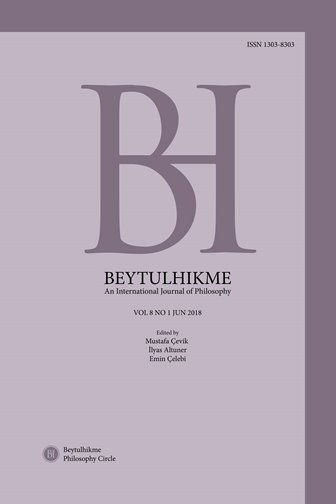Author :
Abstract
Maddi dünyanın ötesinde aşkın bir varlığın varlığı anlamına gelen ve kutsallığı kabul eden Teizm, Tanrı'nın sonsuz, bilinçli, evreni bilen ve güçlü bir kişiliğe sahip olduğu fikrini genellikle savunur. Bu makalede Teizmin İngiliz Filozof Frederick Robert Tennant (1866-1957) tarafından nasıl ele alınıp değerlendirildiğini ve bu düşüncenin diğer felsefi akımlara karşı hangi farklılıklarının ve üstünlüklerinin olduğuna değineceğiz. Buna ek olarak, Tennant'ın pozitif bilimle felsefe ve teolojiyi nasıl uyumlaştırdığı da vurgulanacaktır.
Keywords
Abstract
Theism, which means the existence of a transcendent being beyond the material world and accepting its sanctity, often defend the idea that God has an eternal, conscious, universe-knowing and strong personality. In this paper, I outline and discuss how theism is treated and assessed by English Philosopher Frederick Robert Tennant (1866-1957) and which differences and superiority it can provide against other philosophical movements. In addition, it will be emphasized how Tennant attempts to harmonize positive sciences with philosophy and theology.
Keywords
- Alston, W. P. (1963). Religious Belief and Philosophical Thought. New York: Brace & World, Inc.
- Bertocci, P. A. (1951). Introduction to the Philosophy of Religion. Boston: Prentice- Hall, Inc.
- Eren, M. (2015). Çevre Sorunları Karşısında Sorumluluk Etiği. Kelam Araştırmaları Dergisi, 13 (1), 439-452.
- Hick, J. (1967). Tennant, Frederick Robert. The Encyclopedia of Philosophy, vol 8. (Ed. P. Edwards). New York: Crowell Collier and Macmillian.
- Hick, J. (1963). An Interpretation of Religion. London: Yale University Press.
- McCann, H. J. (2005). Divine Power and Action. The Blackwell Guide to the Philoso- phy of Religion. (Ed. W. E. Mann). Malden: Blackwell Publishing.
- Phillips, D. Z. (1994). Introduction. Traditional Theism and its Modern Alternatives. (Ed. S. Andersen). Aarhus: Aarhus University Press.
- Swinburne, R. (2012). The Argument from Design. Philosophy of Religion. (Eds. L. P. Pojman & M. Rea). Toronto: Nelson Education Ltd.
- Swinburne, R. (1993). The Coherence of Theism. Oxford: Clarendon Press.
- Tennant, F. R. (1943). The Nature of Belief. London: The Whitefriars Press. Öz: Maddi dünyanın ötesinde aşkın bir varlığın varlığı anlamına gelen ve kutsallığı kabul eden Teizm, Tanrı'nın sonsuz, bilinçli, evreni bilen ve güçlü bir kişiliğe sahip olduğu fikrini genellikle savunur. Bu makalede Teizmin İngiliz Filozof Frederick Robert Tennant (1866-1957) tarafından nasıl ele alınıp değerlendirildiğini ve bu düşüncenin diğer felsefi akımlara karşı hangi farklılıklarının ve üstünlüklerinin olduğuna değineceğiz. Buna ek olarak, Tennant'ın pozitif bilimle felsefe ve teolojiyi nasıl uyumlaştırdığı da vurgulanacaktır. Anahtar Kelimeler: Teizm, Tennant, Tanrı, empirik, rasyonel, evrim, bilim..
- (TUBITAK, 2219/2015/1) for their support in this work.





